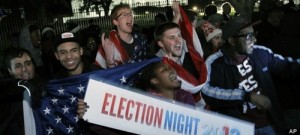By: Laura Owsiany
Conventional wisdom generally accepts that young people are the demographic least interested in politics.
Though there are 32 million eligible voters aged 18-24, giving young people sizeable influence over electoral outcomes, only 41.2% of them voted in the 2012 presidential election.
As the mid-term elections grow nearer, we are reminded that youth vote in much lower percentages in mid-term congressional elections. At a turnout of 21.3% in 2010, young voters were less than half as likely as people over 65 to vote in the midterms.
Nevertheless, in 2012, the youth vote controlled the outcome of up to eighty electoral votes, according to The Center for Information & Research on Civic Learning and Engagement, and corroborated by multiple news sources, meaning that young people assured the re-election of Barack Obama.
Youth voter turnout has fluctuated, but remained within 5 percentage points of contemporary levels since the voting age was lowered to 18 in the early 1970s. Today’s voters, the often-criticized millennial generation, are no less engaged than previous generations.
But still, in the age of #YesAllWomen, #BringBackOurGirls and #Kony2012 young people are frequently accused of shallow involvement in politics, only brought to their attention by social media buzzwords, video clips and sensational headlines.
Some claim the increased use of social media and technology has lead to the simplification and the polarization of politics. 140 character tweets and headlines whose accompanying articles few seem to read lend themselves to generalizations and shock value that often spark divisive and fierce debate, but lack nuance. Polarization normally drives away the moderates and the apathetic, who are often young people.
But could polarized politics be good for youth engagement? If millennials really behave the way the media portrays—drawn in by flashy headlines and easy reads—polarized politics can only inspire more youth political participation. In fact, a recent study at the MacArthur Foundation found that substantial numbers of young people are engaged in “participatory politics” online. While most are engaged on and offline, 16% of young people engage in only online politics, 16% that would otherwise not be engaged. Engagement can consist of commenting on an article, writing an op-ed, blogging about politics, or forwarding a video clip.
The increased attention on young people, especially in their political role and as voters, is a good thing. Criticism also allows us to examine our politics and look beyond the surface. Once engaged, it is easier to become an informed, rather than superficial voter, and remain so for the rest of one’s life. This phenomenon can be seen among college students.
Students or those with some college experience are much more likely to vote than those without. But over half of voters 18-24 have no college experience, according to ProjectVote. Those who do are overwhelmingly white.
Voting young forms a life-long habit, and in the case of racial minorities and uneducated youth, can have a domino effect, bringing greater voter turnout in marginalized communities.
Young people are under-registered, under-represented, and most of all, underestimated. But before the status quo formally changes, young people need to engage themselves. Learn about government. Get excited about an issue and dive in, but take a minute to think before you post. And most important: vote.
Image: Associated Press

